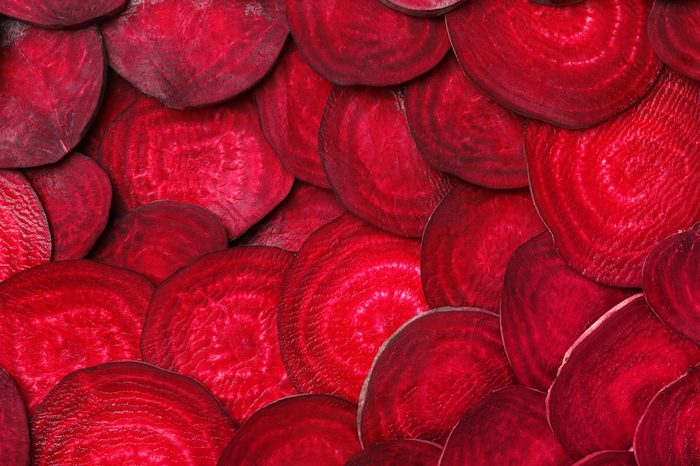
You can’t beat beets
For many people, the only times they see beets are in the sad, untouched section of a salad bar, along with garbanzo beans and those mini corn things. But these vibrant veggies deserve to be part of your regular diet, not only because they taste delicious but because they are good for your health too. There are at least 15 known bio-reactive compounds in the humble red root, according to a 2019 research analysis published in the journal Molecules. Many of these compounds have been found to have potential health benefits in studies in animals and laboratory-grown cells, according to the report.
Here are the health benefits of beets—and a couple of side effects that may surprise you.
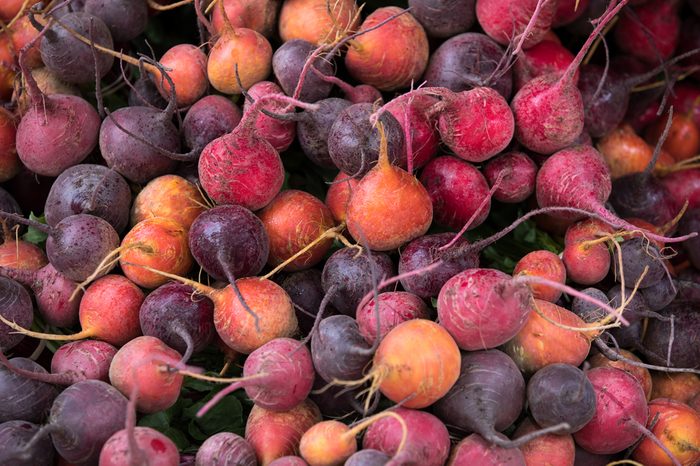
Health benefit: Beets may help prevent cancer
Beets may have potential when it comes to preventing cancer, according to the Molecules study. Three compounds found in beets—syringic acid, rutin, and betalains—were found to be “chemopreventative,” meaning that they help prevent cancer, while two more compounds—astragalin and Oleanolic Acid—were found to inhibit tumour growth. In addition, they found that beetroot fibre reduced pre-cancerous lesions in rats. While studies in animals don’t necessarily translate to results in people, Jennifer Fitzgibbon, RD, a registered oncology dietitian at Stony Brook Cancer Center, says that she makes a point to regularly include them in her diet and recommends them to her patients.
(Psst: These are the most common types of cancer in Canada.)
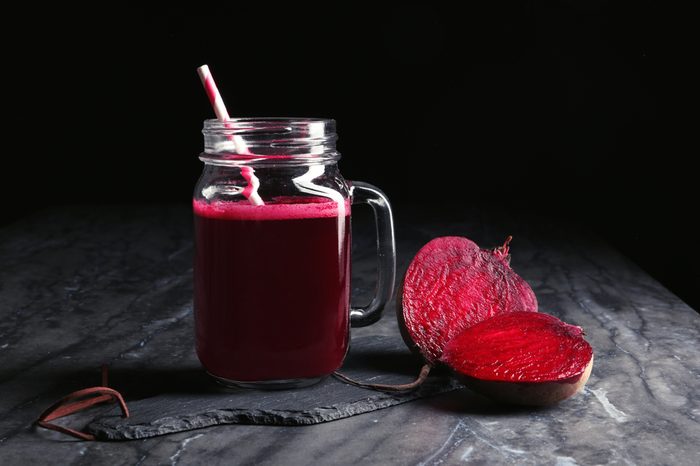
Health benefit: Beets may lower heart disease risk
Another reason Fitzgibbon says she puts beets on her all-star list is for their heart-health benefits. Beets contain anti-inflammatory compounds and antioxidants and are a good source of dietary nitrate. According a small 2008 study in the journal Hypertension, 10 healthy people who drank about 16 ounces of beetroot juice had a decline in blood pressure three hours later, around the time of peak blood-levels of nitrate. Nitrate-containing produce may be one reason why a diet rich in fruits and veggies is linked to a lower risk of heart disease, according to the study authors.
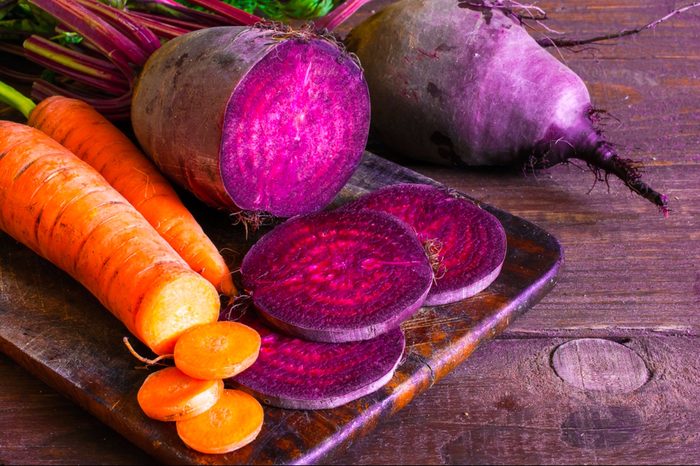
Health benefit: Beets strengthen your immune system
Beets, along with other colourful plants like berries, celery, carrots, and pomegranates, may help strengthen your immune system, improving your ability to fight off disease, says S. Adam Ramin, MD, surgeon and medical director of Urology Cancer Specialists. They’re full of vitamins, minerals, and phytonutrients that your body needs to maintain its defenses, he explains. (Here are some more key natural immune system boosters.)
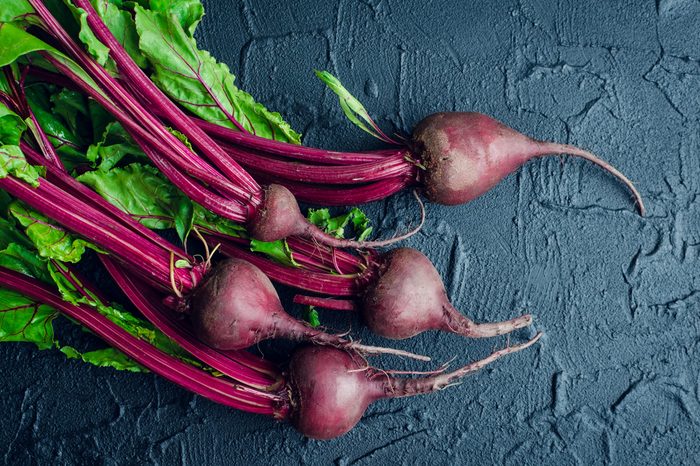
Health benefit: Beets support healthy aging
Beet greens are a good source of lutein, a powerful antioxidant that can help maintain mental sharpness and support healthy aging in adults, says Tiffany DeWitt, RD, a registered dietitian at Abbott. They also help protect the eyes from age-related macular degeneration and cataracts, she adds. For a bigger boost, she recommends combining beet greens with other lutein-rich foods like other leafy greens, romaine lettuce, eggs, and melons. (For a nourishing recipe, try this Tahini Beet Greens Bowl.)
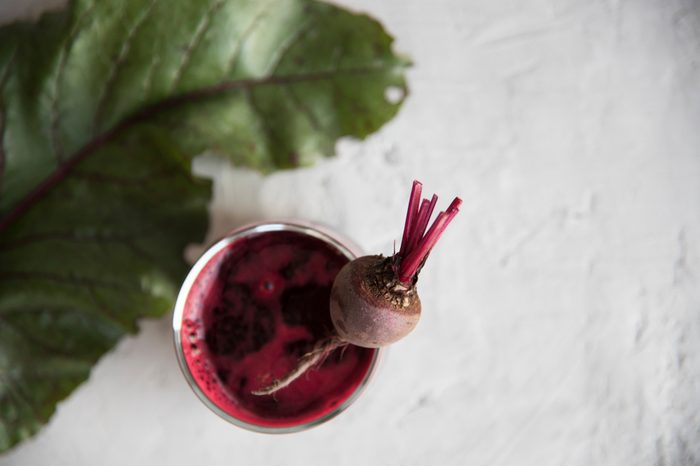
Health benefit: Beets boost endurance
Want to run faster and longer? Drinking beetroot juice improves cardiorespiratory endurance and increases overall cardiovascular efficiency, according to a 2017 meta-analysis published in Nutrients. The performance boost is thought to be from the nitrates found in the root. The study authors hypothesized that it may lessen the effects of hypoxia in the blood, which can negatively impact athletic performance.
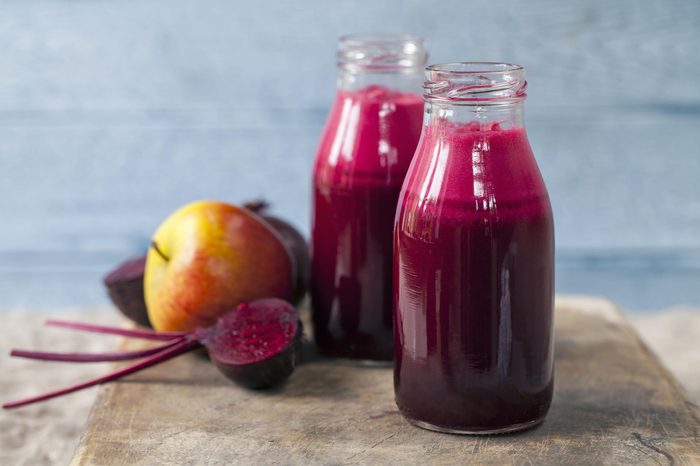
Health benefit: Beets may reduce dementia risk
Beets produce nitric acid, which helps increase blood flow throughout your body, including to your brain. Eating beets has been linked to improved mental functioning, especially as people age, Dewitt says. A study on people over 70 published in Nitric Oxide showed that after eating a high-nitrate breakfast that included beet juice, the subjects had more blood flow to the white matter of their frontal lobes compared to eating a low-nitrate breakfast. (Also, did you know ginkgo biloba is a natural treatment for dementia?)
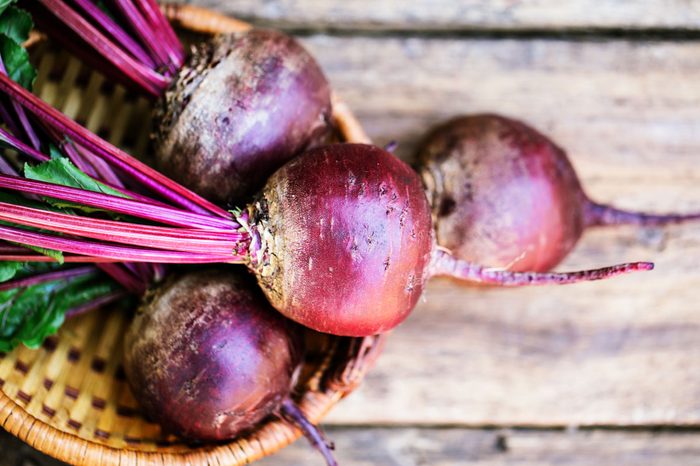
Health benefit: Beets combat constipation
Fibre helps keep your digestive system running smoothly (along with doing other good things for your body), and one of the many health benefits of beets is that they are chock full of it, Fitzgibbon says. With nearly 4 grams of fibre per serving, eating beets regularly can help keep you regular in the bathroom, she says. Women should aim to get roughly 25 grams and men 38 grams of fibre daily, although on average Canadians are eating half of that amount. (For a last-minute brekkie that’s high in fibre, try this Apple and Walnut Muesli.)

Heads up: Beets discolour your stool
Going to the bathroom after eating beets can be quite alarming if you’re not prepared, Fitzgibbon warns. This is because they can turn your poop and/or pee a fairly shocking shade of red. There’s nothing wrong—it’s not blood as many panicked people have assumed—and it doesn’t hurt you. You should find the effect disappears after a day or so, she says.
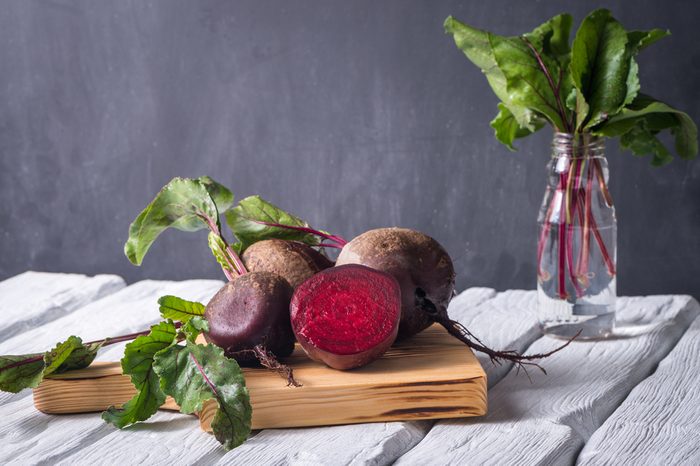
Health risk: Beets contribute to kidney stones
Despite all these health benefits of beets, there is a risk to people susceptible to certain types of kidney stones, Dr. Ramin says. Beets, particularly when concentrated into powder or juice, contain high levels of oxalate, a compound that contributes to the production and growth of oxalate-containing kidney stones, he explains. If you’ve had problems with kidney stones in the past or have reason to suspect you are at risk for them, talk to your doctor about your diet, he adds.
Now that you know about the health benefits of beets, make sure you read up on these anti-aging foods that can add years to your life.
